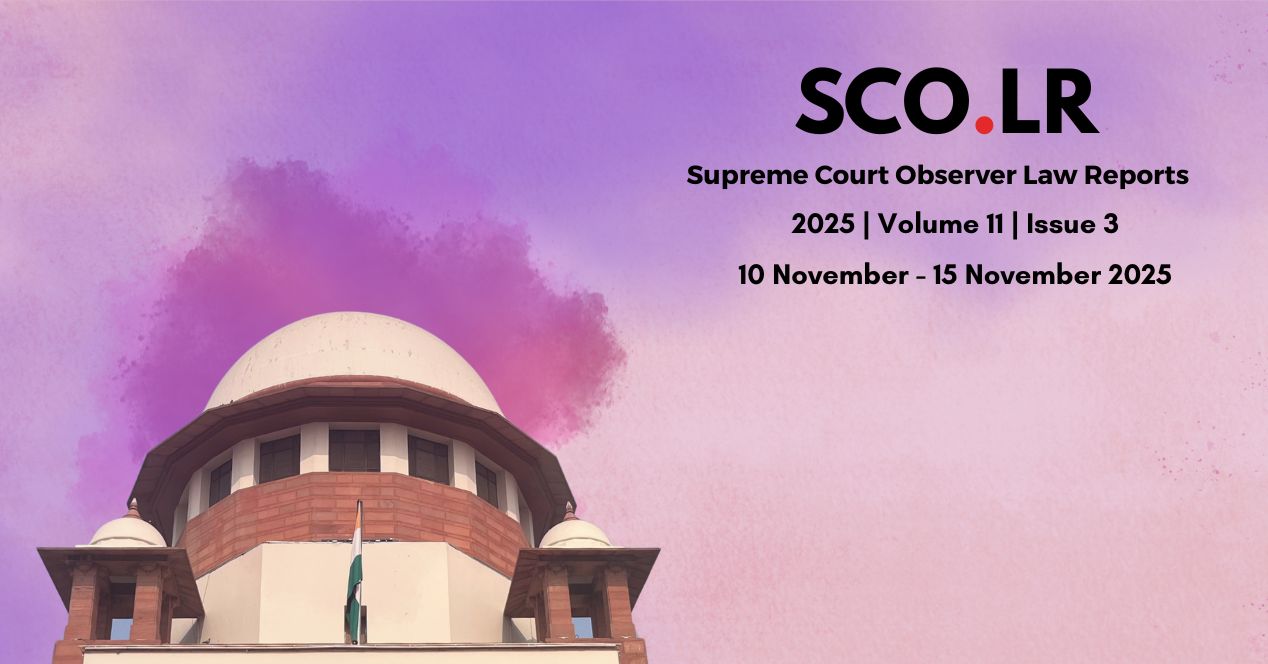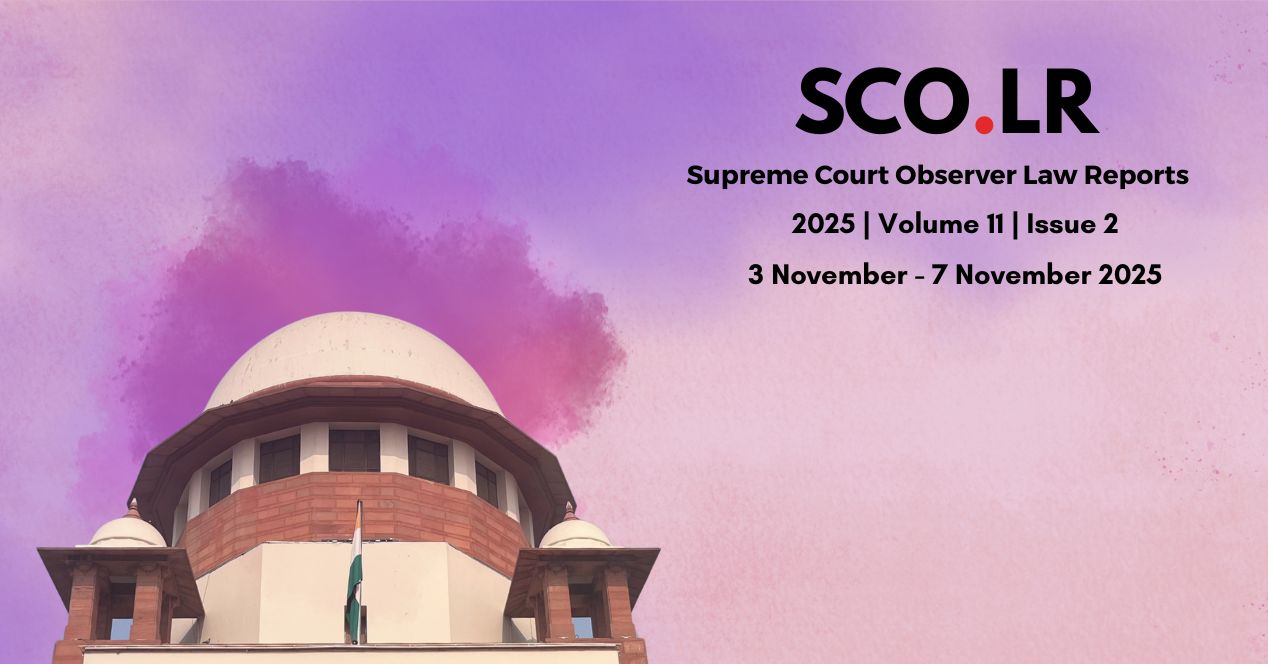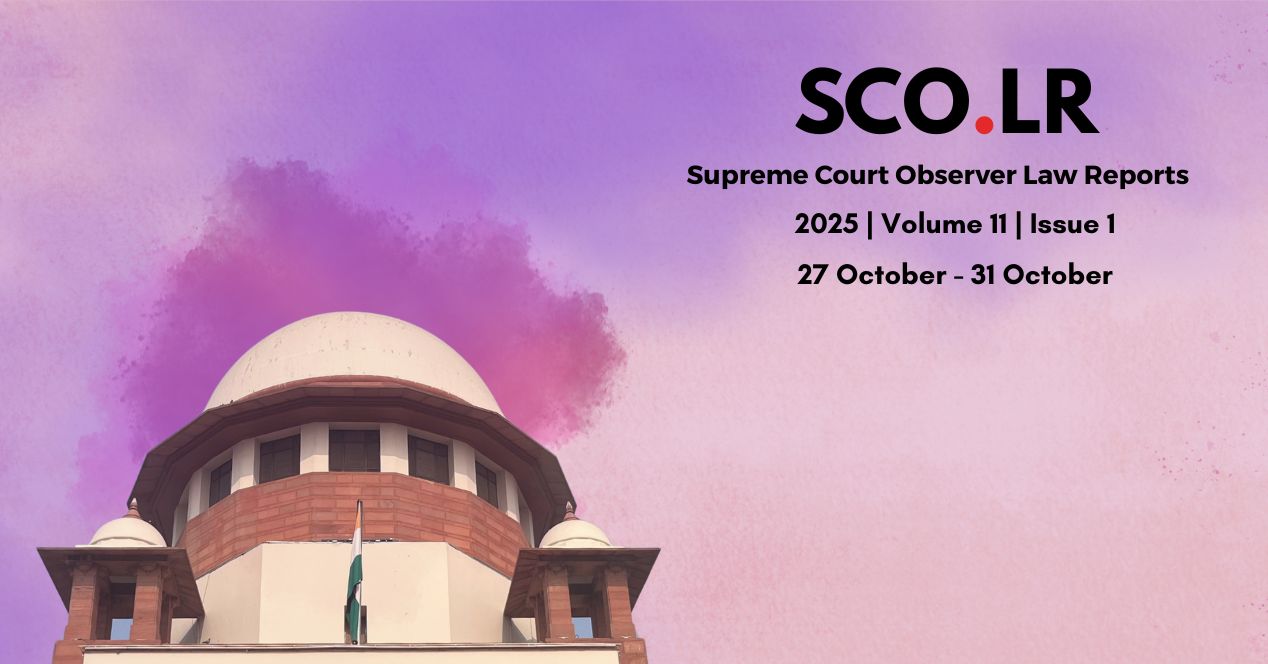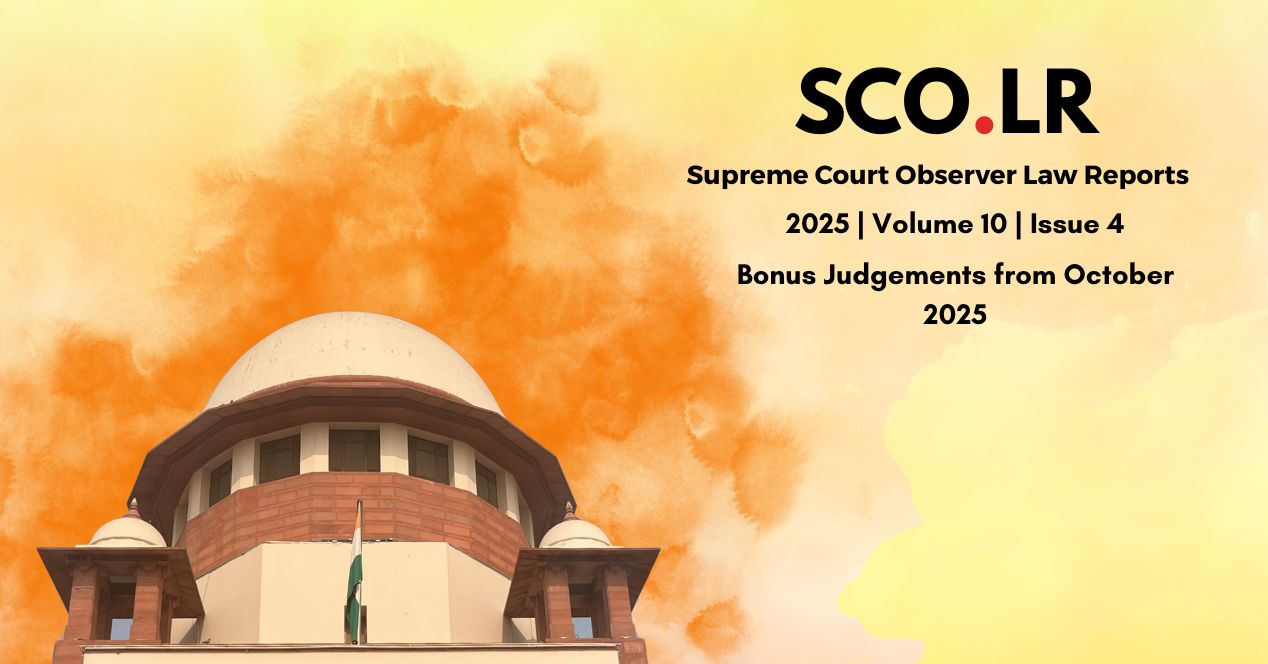Analysis
SCO.LR | 2025 | Volume 11 | Issue 4
In this Issue of SCO.LR, we bring you five important judgements from 17 November to 22 November 2025
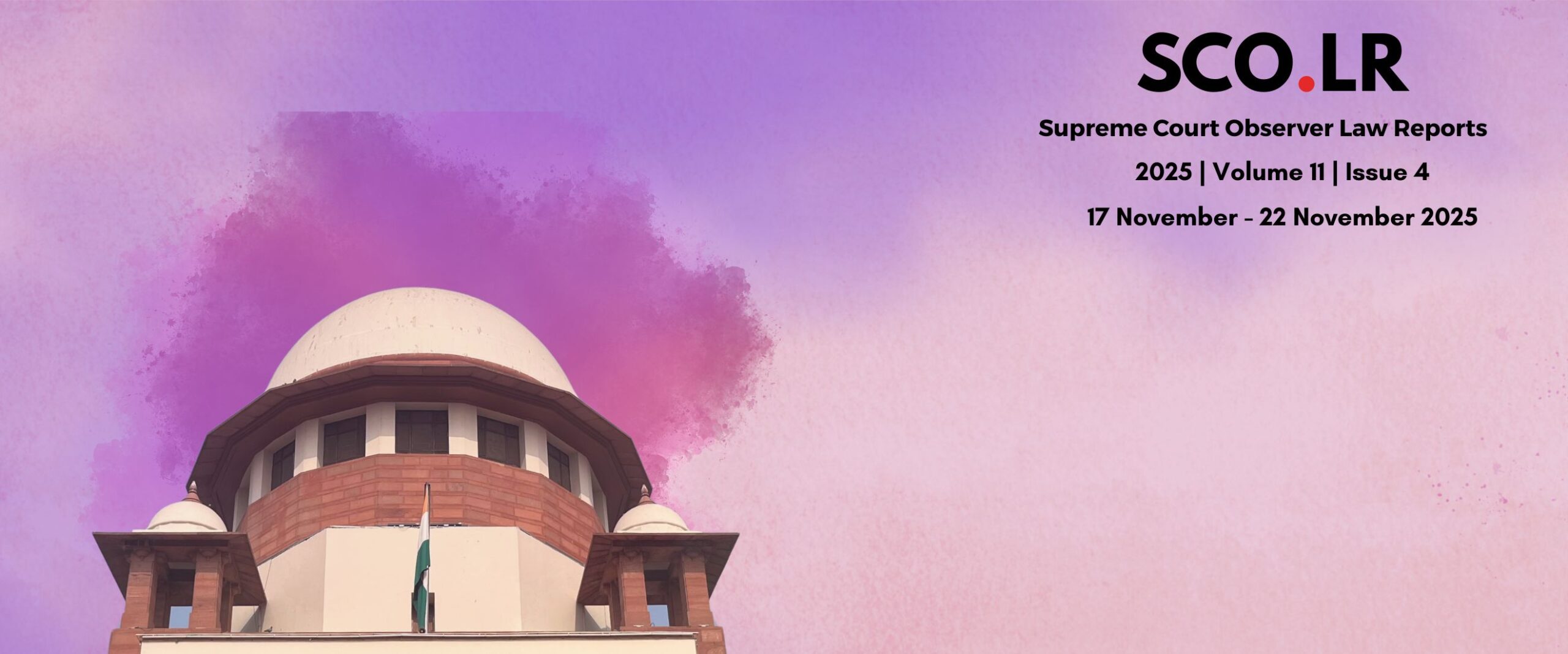
Volume 11 Issue 4 of the Supreme Court Observer Law Reports (SCO.LR) is here!
In the fourth issue of SCO.LR this month, we list notable judgements of the Supreme Court between 17 November to 22 November 2025. This week’s compilation features environment related cases strongly, with summaries available on the preservation of tiger reserves in the country, the validity of retrospective environmental clearances, mining activities in Aravali Hills. Also this week are cases on the appointment of arbitrators when parties agree to foreign-seated arbitration and the question of whether a high interest rate in commercial loans is against public policy.
Read all the judgements in an HTML friendly format on our SCO.LR page!
*********
The Supreme Court Observer Law Reports
SCO.LR | Volume 11 | Issue 4
17 November – 22 November 2025
********
Regulation of Tiger Reserves in India
17 November 2025
Citations: 2025 INSC 1325 | 2025 SCO.LR 11(4)[16]
Bench: Chief Justice B.R. Gavai, Justices A.G. Masih and A.S. Chandurkar
The Supreme Court held that it is its duty to adopt restorative measures that mitigate environmental degradation and prioritise mitigation of future risk to the environment.
In 2024, the Supreme Court set up an Expert Committee to carry out an in-depth inquiry into the Corbett Tiger Reserve in Uttarakhand. The committee had to determine measures for the effective management of the Corbett Reserve and other Tiger Reserves in the country.
The Supreme Court granted Uttarakhand two months to submit a plan for the restoration of the Corbett Tiger Reserve, based on the Expert Committee’s recommendations. It held that Tiger Safaris cannot be conducted in a critical tiger habitat and should be on non-forest land. State governments were directed to prepare a Tiger Conservation plan within three months and notify eco-sensitive zones around all Tiger Reserves.
Key words/phrases: Continuing mandamus—Corbett Tiger Reserve—in-situ ecological restoration and conservation—National Tiger Conservation Authority constituted under Wild Life (Protection) Act, 1972—Expert Committee report—guidelines for mitigation of ecological damage—Tiger Safaris in non-forest land—Tiger Conservation Plan
Read the Judgement here.
Mind map**********
Validity of Retrospective Environmental Clearance
Confederation of Real Estate Developers of India (CREDAI) v Vanashakti
18 November 2025
Citations: 2025 INSC 1326 | 2025 SCO.LR 11(4)[17]
Bench: Chief Justice B.R. Gavai, Justices Ujjal Bhuyan and K.V. Chandran
The Supreme Court held that retrospective Environmental Clearance (EC) can be granted in exceptional circumstances—the Environment Protection Act (EPA) 1986 does not prohibit it.
In 2017, the Union Ministry of Environment, Forests and Climate Change notified the process for grant of EC for projects which had not obtained prior Clearance. Similar notifications had been quashed in 2014 and 2015. In 2021, the Ministry issued an Office Memorandum (OM) formulating Standard Operating Procedure (SOP) for grant of ECs in cases of violation of environment norms. In Vanashakti v. Union of India (2025) a two-Judge Bench of the Supreme Court quashed the 2017 Notification and 2021 OM, holding that a retrospective EC was completely alien to environmental jurisprudence. A review petition was filed against the decision.
The Court allowed the review petition against Vanashakti, holding that it is inconsistent with prior landmark decisions of the Court. The Bench held that Vanashakti’s view that despite payment of penalty, projects that violate environment norms should be demolished, contravened Section 15 of the EPA. The Bench recalled the Vanashakti decision.
Key words/phrases: Section 15—Environment Protection Act (EPA) 1986—Vanashakti v Union of India—quashed 2017 and 2021 Office Memorandums—OMs allowed retrospective Environmental clearance—Review Petition filed—decision by Bench of same strength—Reference to larger Bench is the only option—Vanashakti decision is recalled
Read the Judgement here.
Mind map**********
Whether High Interest Rates in Commercial Transactions are Against Public Policy
Srilakshmi Hotel Pvt Ltd v Shriram City Union Finance Ltd
18 November 2025
Citations: 2025 INSC 1327 | 2025 SCO.LR 11(4)[18]
Bench: Justices J.B. Pardiwala and K.V. Viswanathan
The Supreme Court held that imposition of high interest rates in a commercial loan transaction does not violate public policy.
Sri Lakshmi Hotel availed two commercial loans for a total of ₹1,57,25,000/- from Sriram City Union Finance in 2006 at an interest rate of 24 percent per annum. The loans were considered high-risk, as the funds were sought to clear a previously defaulted bank loan. Sri Lakshmi Hotel defaulted again and paid only ₹44,66,250/-. Sriram City Union Finance initiated arbitration proceedings and were awarded the claim amount of ₹2,21,08,244/- with 24 percent p.a. interest until realisation. Sri Lakshmi Hotel challenged the award arguing that the interest was unconscionable. A single judge and division bench of the Madras High Court both upheld the award.
The Supreme Court upheld the award and the decisions of the High Court Benches. It held that though a 24 percent interest can be considered unfair, it reflects the lender’s risk in uncertain market conditions. The Bench noted that justifiability of the rate of interest would depend on the terms and conditions entered into by the parties.
Key words/phrases: Public policy doctrine—commercial interest rates in arbitration—two loans at 24% p.a. to clear prior default—borrower defaulted—arbitral award granted with 24% interest—Madras High Court upheld—Supreme Court held high interest not per se against public policy— reflects commercial risk—contractual terms prevail—award sustained
Read the Judgement here.
Mindmap**********
Court orders Management Plan for Sustainable Mining in Aravali
In Re: Issues relating to definition of Aravali hills and ranges
20 November 2025
Citations: 2025 INSC 1338 | 2025 SCO.LR 11(4)[19]
Bench: CJI B.R. Gavai and Justices K.V. Chandran and N.V. Anjaria
The Supreme Court accepted the Union government’s elevation-based definition of the Aravali Hills and Ranges. The definition will be incorporated in a Court mandated study to demarcate areas in the Aravali region for sustainable mining.
The matter was taken up suo moto after the question of classification of Aravalli hills arose in two ongoing proceedings; M.C. Mehta v Union of India and T.N. Godavarman v Union of India. The study will involve a geo-referenced ecological assessment to enable development of a Management Plan for Sustainable Mining (MPSM). The Court passed its order in view of the Saranda Wildlife Sanctuary matter in which a similar MPSM was formulated.
The Court recognised the significance of the definition as the Aravali Hills and Ranges are among the oldest geological features on Earth and serve as a critical “shield” against the spread of the Thar desert. The Union’s uniform definition excludes all hills below 100 meters from the local relief. The Court ordered that no new mining lease be granted until the MPSM is finalised. The Order does not impose a ban on ongoing legal mining activities but mandates strict adherence to the Committee’s recommendations.
Keywords/phrases: Aravali hills and ranges—definition of Aravali Hills—for purpose of mining—ecological shield against spread of Thar desert—Court accepts Union definition—orders Management Plan for Sustainable Mining—conducted previously for Saranda Wildlife Sanctuary—no ban on existing projects—new leases to be granted only as per MPSM.
Read the Judgement here.
*********
Section 11 Petition Not Maintainable for Foreign Seated Arbitration
Balaji Steel Trade v Fludor Benin S. A.
21 November 2025
Citations: 2025 INSC 1342 | 2025 SCO.LR 11(4)[20]
Bench: Justices P.S. Narasimha and A.S. Chandurkar
The Supreme Court held that a petition under Section 11 of the Arbitration and Conciliation Act, 1996 is not maintainable where the parties have agreed to a foreign-seated arbitration and the supervisory jurisdiction lies with the courts of the chosen seat.
Balaji Steel Trade entered into a Collaboration and Buy Back Agreement in 2018 with Fludor Benin. Subsequently, they entered into a Buyer-Seller Agreement which superseded the initial agreement, and executed a series of Sales Contracts. When a dispute arose, Balaji Steel Trade sought appointment of an arbitrator in India based on arbitration clauses in the subsequent Agreements. The sales contracts related only to individual consignments and did not replace the earlier Buyer and Seller Agreement, which provided that the seat of arbitration was in Benin. The Delhi High Court recognised the Benin arbitration noting that the dispute arose solely under the Buyer and Seller Agreement.
The Supreme Court upheld this position. It held that the Buyer and Seller Agreement was the operative contract and that Benin was the juridical seat, with Benin law governing the arbitration. Since the Benin-seated proceedings had already concluded with a final award, Indian courts had no jurisdiction to appoint an arbitrator under Section 11.
Keywords/phrases: Section 11 Arbitration Act 1996–foreign seated arbitration–jurisdiction to appoint arbitrator–Buyer and Seller Agreement–Sales Contracts–High Seas Sale Agreements–composite reference–petition dismissed
Read the Judgement here.
Mind map
